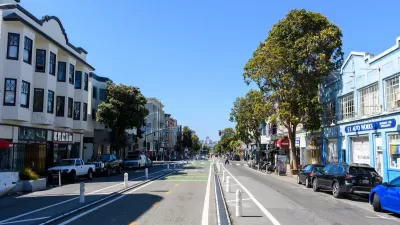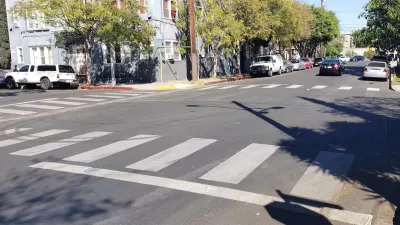Emily Badger tracks the hacking phenomenon as it migrates from the virtual to the physical world, and the official channels that are embracing and facilitating its emergence.
While the attraction and growing popularity of the DIY/Tactical/Temporary urban intervention phenomenon rests at least partially in the premise that such projects can be done outside the bounds of government approval and participation, that doesn't mean public officials aren't interested in embracing their rogue interventionist brethren. Case in point: San Francisco, the home to the inaugural Park(ing) Day event (a touchstone for the tactical urbanist movement), where the city "plans to roll out on May 15 a single website that will curate in one place all the possibilities, permits, and guidelines for engaging city streets, from how to apply for a bike corral to who to work with in city government to get one. The idea is not unlike the one-stop online data portals that many cities now have to facilitate citizen participation in the digital world," writes Badger.
While it's clear that cities are interested in engaging and partnering with (if not co-opting) "street hackers," one wonders if making such interventions formally permitted isn't besides the point. In drawing the analogy to their digital namesake, if hacking was condoned, would it still be interesting? Better yet, would it still be hacking?
FULL STORY: The Street Hacker, Officially Embraced

Maui's Vacation Rental Debate Turns Ugly
Verbal attacks, misinformation campaigns and fistfights plague a high-stakes debate to convert thousands of vacation rentals into long-term housing.

Planetizen Federal Action Tracker
A weekly monitor of how Trump’s orders and actions are impacting planners and planning in America.

In Urban Planning, AI Prompting Could be the New Design Thinking
Creativity has long been key to great urban design. What if we see AI as our new creative partner?

King County Supportive Housing Program Offers Hope for Unhoused Residents
The county is taking a ‘Housing First’ approach that prioritizes getting people into housing, then offering wraparound supportive services.

Researchers Use AI to Get Clearer Picture of US Housing
Analysts are using artificial intelligence to supercharge their research by allowing them to comb through data faster. Though these AI tools can be error prone, they save time and housing researchers are optimistic about the future.

Making Shared Micromobility More Inclusive
Cities and shared mobility system operators can do more to include people with disabilities in planning and operations, per a new report.
Urban Design for Planners 1: Software Tools
This six-course series explores essential urban design concepts using open source software and equips planners with the tools they need to participate fully in the urban design process.
Planning for Universal Design
Learn the tools for implementing Universal Design in planning regulations.
planning NEXT
Appalachian Highlands Housing Partners
Mpact (founded as Rail~Volution)
City of Camden Redevelopment Agency
City of Astoria
City of Portland
City of Laramie




























